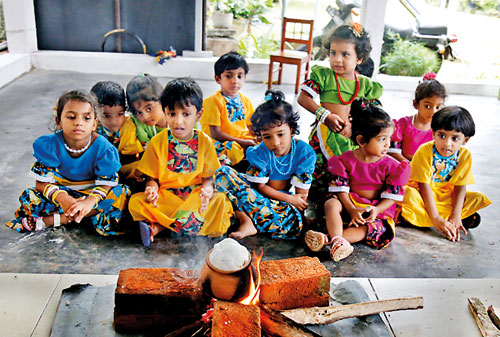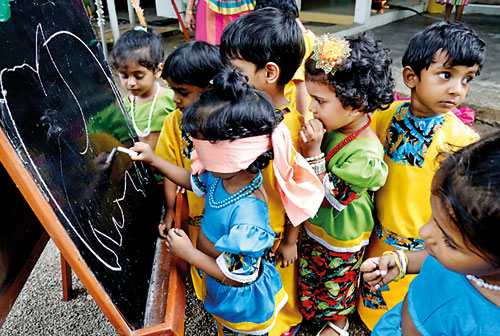New Year Rituals
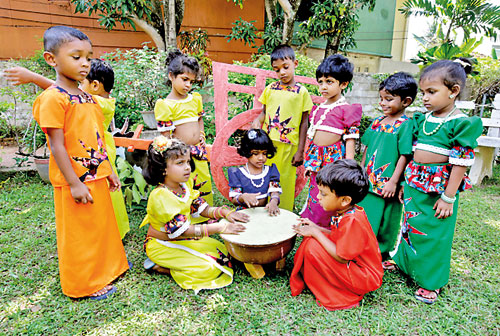 The fourteenth of April is a very significant day in Sri Lanka as it marks the dawn of Sinhala and Tamil New Year. The New Year which is known as ‘Aluth Avurudha’ in Sinhala, and ‘Puththandu’ in Tamil is celebrated by both communities through various rituals and customs. Let’s take a look at some of these rituals and customs which are still followed by most people.
The fourteenth of April is a very significant day in Sri Lanka as it marks the dawn of Sinhala and Tamil New Year. The New Year which is known as ‘Aluth Avurudha’ in Sinhala, and ‘Puththandu’ in Tamil is celebrated by both communities through various rituals and customs. Let’s take a look at some of these rituals and customs which are still followed by most people.
One such custom that Sinhalese follow before the New Year is spotting the moon on the last day of the Old Year, which is April 13. On this day people will also ceremoniously bathe for the last time in the Old Year. Before bathing, they will apply a herbal mixture called ‘Nanu’ on their heads.
Both communities also clean their homes in preparation for the New Year. It’s customary for Tamil households to spray saffron water in the front area of their homes. They also decorate this area with colourful ‘Kolam’ which are made of coloured raw rice flour.
After the Old Year has ended and before the New Year has dawned, there is a transition period that is called ‘Nonagathaya’ or inauspicious time. During this time it is against tradition to do any work or cook any meals. Instead most families engage in religious activities such as visiting the temple or kovil.
To mark the dawn of the New Year, families light the hearth for the first time. This is done, wearing clothes in the auspicious colours and facing the auspicious direction. Usually a clay pot full of milk is placed on the hearth and is allowed to boil until it overflows. The overflowing of the milk represents prosperity for the family and home.
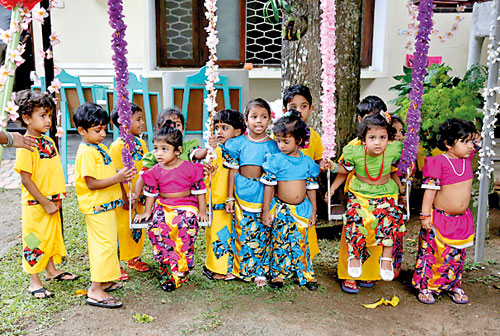 Once this is done, the first meal can be prepared. This includes milkrice, jaggery rice, and sweetmeats such as kokis, aasmi, kevum and laddu. This food is later laid on a table and is eaten together by the family at the auspicious time.
Once this is done, the first meal can be prepared. This includes milkrice, jaggery rice, and sweetmeats such as kokis, aasmi, kevum and laddu. This food is later laid on a table and is eaten together by the family at the auspicious time.
New Year time is also for visiting relatives and neighbours. It’s a custom to take gifts of sweetmeats and other festive food when making such visits. Relatives may also exchange gifts and elders are usually greeted with betel leaves.
In Tamil households the head of the family gives each family member money, betel leaves, paddy and flowers as part of the custom called ‘Kai Vishesham’. This is done for good luck. Similarly the Sinhalese custom called ‘Ganu Denu’ is where people exchange money with each other, in order to bring luck in the New Year.
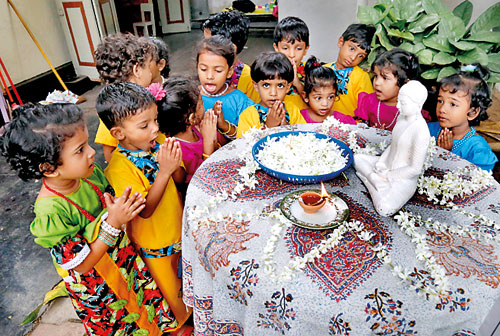 Another ritual followed by Sinhalese is the applying of oil on the head. Usually the eldest in the family will apply herbal oil on each member of the family. However, sometimes people go to the village temple instead, where the head priest will apply the oil on their heads. Similarly Tamils will apply a herbal mixture called ‘Maruthu Neer’ on the head of each family member before they bathe for the New Year. This mixture is prepared by the Hindu priest and is made of herbal water, flowers, leaves, milk and saffron, as well as other ingredients.
Another ritual followed by Sinhalese is the applying of oil on the head. Usually the eldest in the family will apply herbal oil on each member of the family. However, sometimes people go to the village temple instead, where the head priest will apply the oil on their heads. Similarly Tamils will apply a herbal mixture called ‘Maruthu Neer’ on the head of each family member before they bathe for the New Year. This mixture is prepared by the Hindu priest and is made of herbal water, flowers, leaves, milk and saffron, as well as other ingredients.
It is also customary not to begin any work in the New Year until the auspicious time to do so. Then, the adults will start work according to their profession. If they are farmers they will start work in the fields. Children will also start their studies during this time. As many people go back to their villages and hometowns during this season, there is also an auspicious time for them to leave home for their jobs.
After the rituals are completed, families and neighbours, particularly in the villages, have fun participating in New Year Games. These include outdoor games such as Kotta Pora (pillow fights), Kana Mutti Bindeema (smashing the pot), climbing the grease pole, marking the eye of the elephant, Raban playing,
Onchili Padeema and so on as well as indoor games like Olinda Keliya and Pancha Keliya.
